Understanding Nutritional Needs of Pet Birds
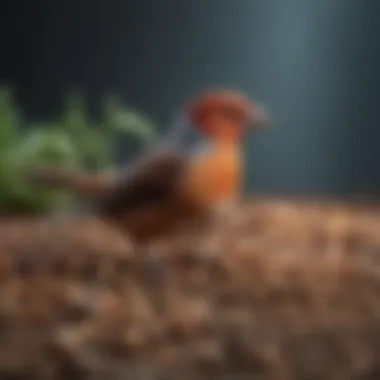
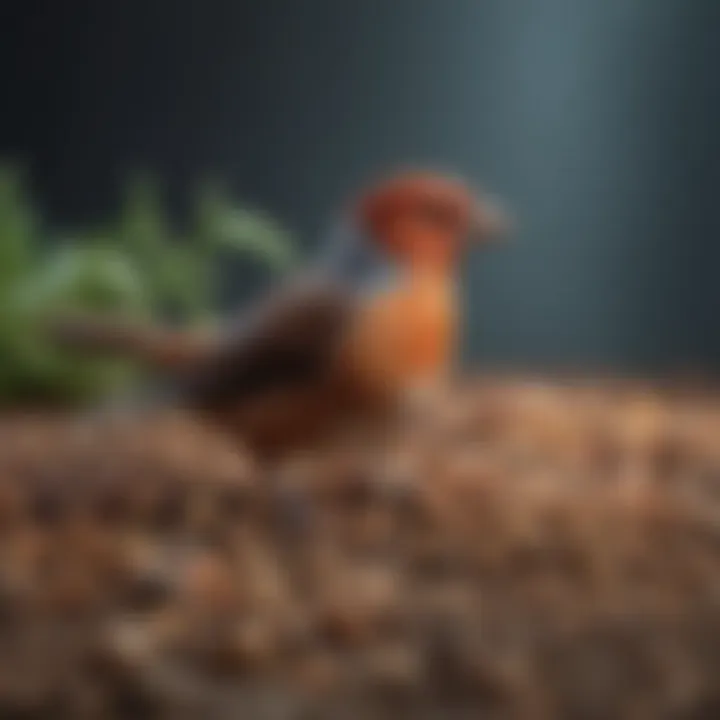
Intro
Understanding the dietary needs of pet birds is essential for their health and longevity. Many first-time bird owners may not realize that birds have specific nutritional requirements that differ greatly from other pets, such as dogs or cats. Providing a proper diet can not only enhance the physical well-being of avian companions but also improve their mental health and mood.
This article will cover the importance of a balanced diet, the specific food categories important for various species, and common misconceptions surrounding avian nutrition. Additionally, readers will find practical tips on how to implement feeding strategies tailored to their bird's needs.
Care Tips
Taking care of pet birds involves more than just feeding them. It requires attention to their environment, health, and overall well-being. Here are some essential care tips to consider:
Daily Care Routines
Establishing a daily routine is key to a bird's comfort and security. Start each day with fresh water and a clean food dish. Monitor their eating habits and note any changes. Engaging with your bird every day helps strengthen your bond.
Cage Setup and Maintenance
The cage is a crucial element of a bird's life. Choosing the right size and type is fundamental. Ensure the bars are appropriately spaced for your bird's size to prevent escape or injury. For maintenance, regularly clean the cage with bird-safe products to prevent bacteria growth.
Hygiene and Cleaning Practices
Keeping your bird's environment clean is essential for avoiding health issues. Daily tasks might include removing uneaten food, replacing soiled bedding, and cleaning toys. A thorough cleanse of the cage should be performed weekly. The use of safe, non-toxic cleaning agents is vital.
Seasonal Care Adjustments
Birds can be sensitive to temperature and humidity changes. During colder months, ensure they are not exposed to drafts. In warmer climates, provide sufficient ventilation and shade. Adjust diet seasonally; for example, adding more fresh fruits in summer can help with hydration.
Behavioral Insights
Understanding your bird's behavior helps in recognizing their needs and emotions. It also strengthens your relationship with them. Consider the following insights:
Understanding Bird Body Language
Birds communicate their feelings through body language. A bird with relaxed feathers and an upright stance is generally comfortable. If the feathers are puffed up, or the bird is hiding, it may be feeling stressed or unwell.
Common Behavioral Issues and Solutions
Misbehavior can arise from boredom or inadequate stimulation. Common issues include excessive screaming or feather plucking. Solutions include providing plenty of toys or increasing the time spent with your bird.
Positive Reinforcement Techniques
Using treats to reinforce good behavior is effective. When training your bird, reward them with a favorite treat when they respond correctly to commands. This establishes trust and encourages learning.
Social Interaction Needs
Birds are social creatures and require interaction to thrive. Spend time interacting with them daily. Allowing them to socialize with other birds can also provide mental stimulation.
Nutrition Guides
Nutrition is crucial for the health and longevity of pet birds. Here are some essential guides to follow:
Essential Diet Components
A balanced diet should include seeds, fruits, vegetables, and pellets. Seeds should be just a part of a varied diet; pellets formulated for specific species often provide essential nutrients not found in seeds alone. Fresh fruits and vegetables should make up about 20-30% of their diet.
Safe and Toxic Foods
Certain foods are safe, while others can be harmful. Safe options include carrots, apples, and broccoli. Conversely, foods such as avocado, chocolate, and caffeine are toxic and should be avoided at all costs.
Supplements and Treats
Offering supplements can be beneficial, particularly during times of stress or illness. Look for vitamins specifically designed for birds. Treats, when offered in moderation, can help with bonding and training.
Feeding Strategies for Different Species
Every bird species has unique dietary needs. For example, macaws require high-fat diets due to their energy levels, while budgies benefit from seeds and fresh greens. Research your specific bird species and tailor their diet accordingly.
Wellness and Health
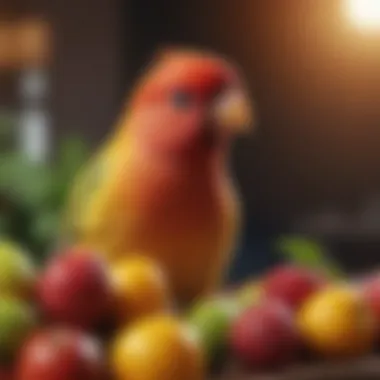
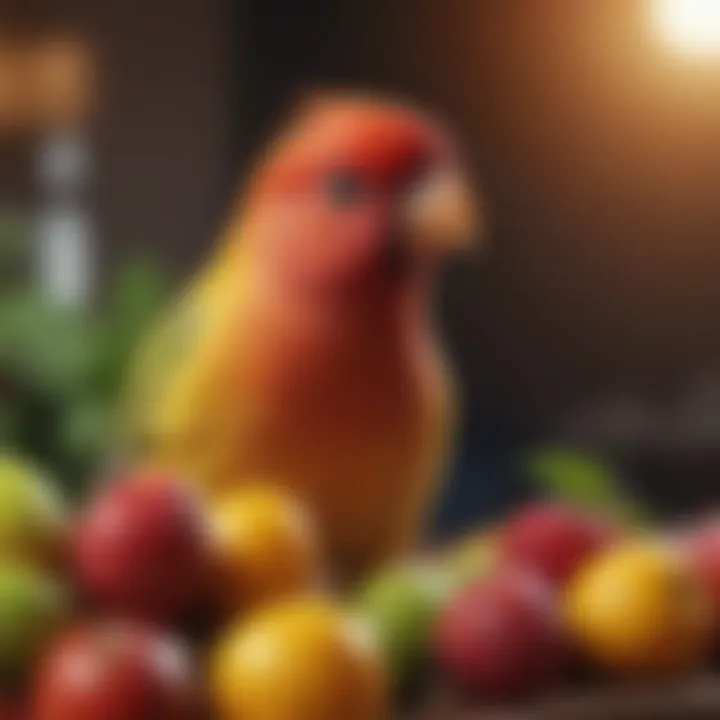
Routine health practices play a significant role in ensuring your bird's well-being. Consider these points:
Routine Health Checkups
Annual veterinary visits are essential. Regular checkups can catch potential health issues early. Ask your vet about necessary vaccinations to ensure your bird stays healthy.
Identifying Symptoms of Illness
Pay attention to any changes in behavior, such as decreased appetite, lethargy, or changes in droppings. These can be signs of illness requiring immediate veterinary attention.
Preventative Care and Vaccinations
Preventative care strategies are wise. Ensuring your avian companion has the necessary vaccinations can save you from trouble down the line. Your vet can guide you on what is needed for your specific bird.
Mental and Emotional Well-being
Birds can suffer from anxiety and depression. Providing mental stimulation through toys, interaction, and training can ensure they remain happy and healthy. A well-rounded approach to care is crucial.
Enriching Activities
Engaging your bird in stimulating activities is vital. Here are a few suggestions:
Toys and Playtime Ideas
Rotate toys regularly to keep boredom at bay. Interactive toys can provide great mental stimulation and entertainment. Hanging toys or puzzle feeders can encourage your bird to engage more.
Training and Tricks
Training can be enjoyable for both you and your bird. Teach simple commands using positive reinforcement. Start with basic commands like "step up" and gradually introduce more complex behaviors.
Outdoor Activities and Interaction
Supervised outdoor time can expose your bird to new sights and sounds. Use a harness or travel cage to keep them safe. Nature can provide significant mental enrichment.
DIY Projects for Mental Stimulation
Creating your own toys can be a fun project. Simple tasks like constructing shreddable items or foraging toys can keep birds entertained. Research DIY ideas that cater to your bird’s interests and abilities.
Prolusion to Pet Bird Nutrition
Nutrition for pet birds plays a crucial role in their overall health and well-being. Understanding the proper dietary needs helps bird keepers provide their pets with the right nutrients to thrive. Ignoring nutritional demands can lead to serious health complications. To foster a healthy and vibrant life for these companions, pet owners must prioritize their dietary requirements.
Balanced nutrition influences various aspects, including feather quality, energy levels, and longevity. Knowing what constitutes a proper diet for different species ultimately leads to better care. Additionally, the article addresses misconceptions around pet bird diets, which may prevent owners from making informed decisions about their pets' food.
Importance of Proper Nutrition
Providing proper nutrition is not just about avoiding health issues; it enhances the quality of life of pet birds. Birds often form strong bonds with their owners. Ensuring these pets receive the right food strengthens these relationships.
Inadequate nutritional intake can result in physical and behavioral issues. For instance:
- Obesity can lead to serious health problems like heart disease.
- Vitamin deficiencies may cause feather plucking and other harmful behaviors.
- Digestive disturbances can arise from low-fiber diets.
Proper nutrition supports healthy development and optimal functioning. It helps birds maintain vibrant colors and strong immune systems.
Common Misunderstandings
Many pet owners harbor misconceptions about what their birds should eat. The belief that seeds alone constitute a complete diet is quite common. However, seeds often lack essential vitamins and minerals. A single-type diet can create severe nutritional imbalances.
Another misunderstanding is about the safety of certain human foods. Not all fruits and vegetables are suitable for birds. Some may even be toxic. Moreover, the expectation that pellets can replace all other food options is misleading. While pellets offer nutritionally balanced options, they should complement fresh foods and treats.
This article aims to clarify these points and provide comprehensive guidelines to ensure pet birds receive the sufficient nutrients they need to thrive.
Fundamental Categories of Bird Food
Understanding the fundamental categories of bird food is essential for providing optimal nutrition to pet birds. Each category serves a unique purpose and contributes to a bird's overall health. Knowing the right balance of various food types can help prevent nutritional deficiencies and support a pet bird's well-being. Additionally, proper nutrition fosters a happier pet, which ultimately leads to a better relationship between the bird and its owner.
Seeds: A Staple Diet for Many Species
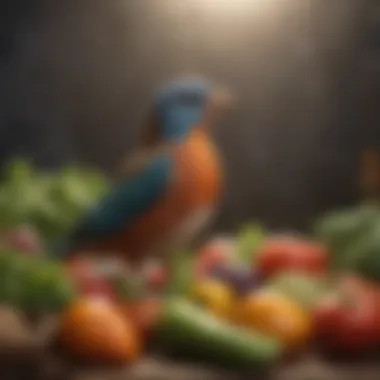
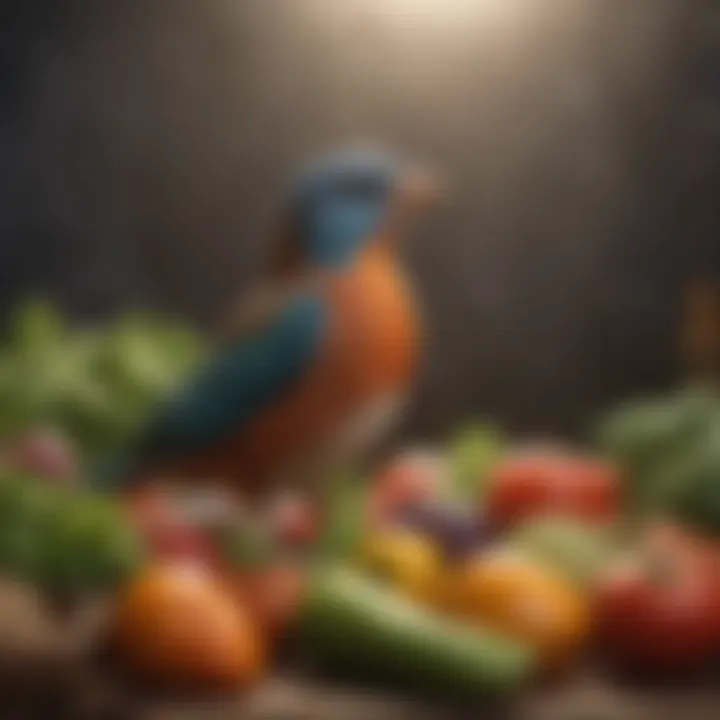
Seeds are perhaps one of the most recognized food sources for birds. They are often used as a primary diet in many species. Various kinds of seeds exist, such as sunflower seeds, millet, and safflower seeds. These food sources are energy-dense and rich in fats, making them appealing to many birds. However, relying solely on seeds can lead to deficiencies in other important nutrients such as vitamins and minerals.
- Types of Seeds: Common seed types include:
- Sunflower seeds
- Safflower seeds
- Oats
- Barley
While seeds can be nutritious, they should not form the exclusive basis of a bird's diet. Owners should be cautious about the fat content and include other food sources to ensure a balanced intake. Birds that consume primarily seeds can face health issues over time, such as obesity and related complications.
Pellets: A Nutritionally Balanced Alternative
Pellets offer a balanced diet option that can meet the various nutritional needs of pet birds. Many pellet brands, such as Harrison's or Zupreem, are designed to provide essential vitamins and minerals, bridging the gaps often found in seed-only diets. These pellets typically consist of a combination of seeds, grains, fruits, and vegetables, all ground together into a convenient form.
- Advantages of Using Pellets:
- Reduces selective feeding on seeds
- Provides essential vitamins and minerals
- Often less fattening than seeds
When transitioning a bird to pellets, it is crucial to do so slowly to avoid digestive stress. Overall, pellets can serve as a reliable mainstay in a pet bird's diet when introduced properly.
Fresh Fruits and Vegetables
Fresh fruits and vegetables are vital components of a pet bird's diet. They provide moisture, fiber, and an array of essential nutrients that enhance overall health. Suitable fruits include apples, berries, and bananas, while vegetables like carrots and leafy greens promote good digestion. Regular incorporation of these foods helps to prevent metabolic disorders.
- Benefits of Fruits and Vegetables:
- Boosts hydration
- Provides fiber for digestive health
- Supplies antioxidants and vitamins
Bird owners should introduce a variety of fruits and vegetables to keep their birds interested and engaged. Wash all produce thoroughly to eliminate pesticide residues, ensuring that it is safe for their feathered companions.
Treats and Supplements
Treats and supplements can play a useful role in maintaining avian health, although they should be limited in quantity. Natural treats, such as nuts or specific bird-safe grains, can function as rewards or enrichment tools. Supplements may be necessary if a bird shows signs of deficiency or when its diet lacks certain nutrients.
- Common Treats Include:
- Dried fruits
- Nuts in moderation
- Millet sprays
However, excess treats can lead to obesity and health issues. Thus, it is essential to monitor their intake carefully. A well-rounded diet includes treats, but they must be used judiciously to foster a healthy lifestyle.
Providing a diverse and balanced diet for pet birds is not only crucial for their health but also enriches their lives, keeping them active and engaged.
Species-Specific Nutritional Needs
Understanding the dietary needs of pet birds involves recognizing that not all birds have the same nutritional requirements. This section will explore the specifics of various species, highlighting how differing anatomical and physiological characteristics can influence their dietary needs. By considering the unique requirements of different species, bird owners can provide better nutrition that enhances overall health and longevity.
Parrots: Varied and Complex Diets
Parrots are known for their intelligence and variety. Their dietary needs reflect this complexity. Typically, a parrot's diet should include a mix of seeds, pellets, fresh fruits, and vegetables. However, not all seeds are created equal. For example, sunflower seeds and peanuts, while palatable, are high in fats and should be offered sparingly. Many parrots thrive on formulated pellets that ensure a balanced intake of essential vitamins and minerals. This diet can prevent obesity and related health issues, which are common in pet parrots.
Parrots also require calcium-rich foods to support bone density and reproductive health. Dark, leafy greens like kale and broccoli are excellent choices in this regard. Additionally, the inclusion of varied fruits such as bananas, apples, and berries can stimulate their appetite and offer hydration. It is essential to introduce new foods gradually to ensure acceptance.
Canaries and Finches: Simple Yet Specific Requirements
Canaries and finches are smaller birds with simpler dietary requirements yet need specific nutrients. Their primary diet consists of high-quality seeds, but should also include small amounts of leafy vegetables and fruits like carrots and apples. It is vital to select seeds specifically meant for these breeds because they require a different balance of fats, proteins, and carbohydrates than larger birds.
These birds are often prone to obesity, so their diet should maintain an appropriate balance. A mixture of seeds and an occasional supplement of greens can keep them healthy and vibrant. Over time, pet owners might find variations they need to adjust based on specific species and individual preferences.
Cockatiels: Nutritional Essentials
Cockatiels are generally social and active birds. Their nutritional needs are akin to those of parrots, yet they have some unique considerations. A balanced diet for a cockatiel typically comprises high-quality pellets that are fortified with vitamins and minerals. While seeds can be a part of their diet, they should not dominate due to potential fat issues.
In addition to pellets and seeds, cockatiels should consume fresh fruits and vegetables daily. Examples include carrots, bell peppers, and leafy greens. It is important that these foods are free from pesticides and thoroughly washed. Introduce these foods slowly, as cockatiels can be picky eaters. Monitoring their diet ensures they receive essential nutrients, promoting overall health.
Budgerigars: Balancing Seeds and Greens
Budgerigars, often called budgies, are small and colorful birds known for their playful nature. Their diet should primarily consist of a good quality seed mix formulated specifically for budgerigars. However, to maintain optimal health, fresh vegetables and fruit must also be part of their diet. Common options include leafy greens and carrots.
Budgies can easily become overweight, so it’s crucial to manage the seed intake. A balanced diet should include no more than 20% seeds, ensuring that they get the required amounts of vitamins and minerals from pellets, fruits, and vegetables. Sugar-heavy foods should be avoided, as they can lead to various health issues. It may also be helpful to provide fresh water daily to keep them hydrated and healthy.
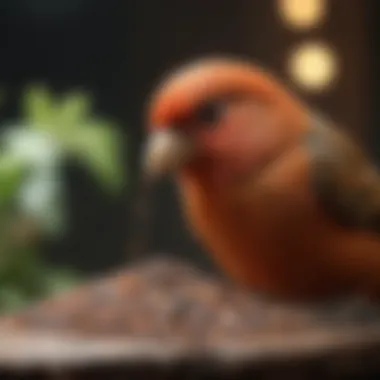
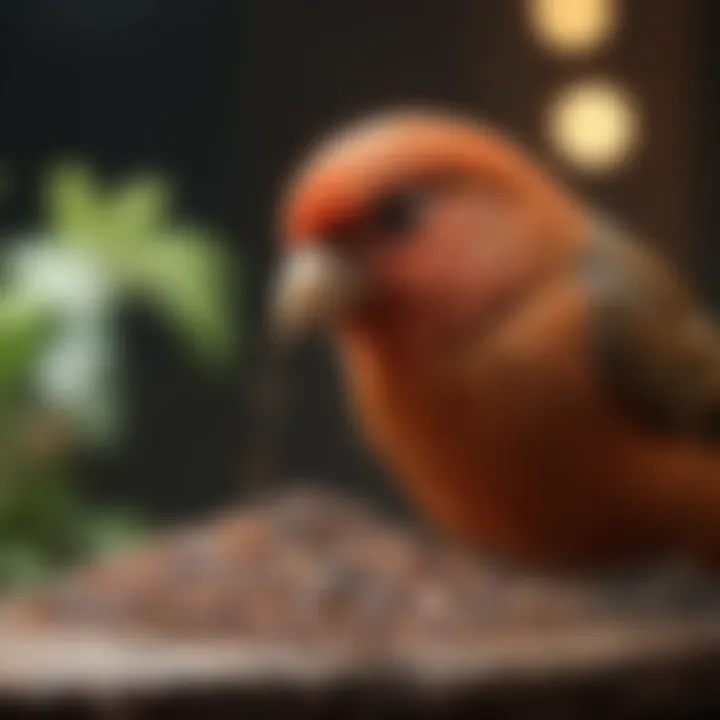
Referencing species-specific needs helps prevent dietary-related health problems. Understanding the individual nutritional requirements ensures better care for our feathered companions.
Feeding Strategies for Pet Birds
Feeding strategies are crucial for the well-being of pet birds. A thoughtful approach to their diet can enhance health, prevent diseases, and improve their overall quality of life. Understanding how to implement proper feeding strategies fosters not only better nutrition but also strengthens the bond between the bird and its owner. Careful consideration of various elements like food transitions, meal planning, and diet monitoring is vital.
How to Transition Food Gradually
Transitioning a pet bird's food should be done slowly to avoid gastrointestinal upset. Birds can be finicky eaters, and sudden changes in their diet may lead to stress or refusal to eat altogether. Begin introducing new foods in small increments. For instance, if you are adding pellets alongside seeds, start with a mix of about 75% of the current food and 25% of the new one. Gradually increase the proportion of the new food over several days.
- Observe the response of your bird to the new food. This ensures they are accepting the changes well.
- Keep the transition timeline flexible. Some birds may need more time.
- Offer different shapes and colors of food to pique their interest.
Creating a Balanced Meal Plan
A balanced meal plan is essential for maximizing the health of pet birds. Such a plan should include a mix of seeds, pellets, fresh fruits, and vegetables. Each bird species may have varied requirements, but the general composition should prioritize nutritional density over mere caloric intake.
- Seeds and Pellets: A strong base of high-quality pellets is recommended, with seeds included as a smaller, supplementary part of the diet.
- Fruits and Vegetables: Introduce a variety of fresh produce regularly. Aim for a colorful array to ensure all essential vitamins and minerals are covered.
- Monitoring Bird Preferences: Birds can develop preferences, and even within a given category, they may choose specific items over others. Understanding what they like helps enhance acceptance of the meal plan.
Monitoring Food Intake and Adjusting Diet
Regularly monitoring your bird's food intake is essential for adjusting the diet based on their needs. Changes in a bird's eating habits can signal various issues, from boredom with the diet to potential health concerns.
- Keep a log of what and how much your bird eats. This ensures you catch any changes early.
- If you notice a decrease in food consumption, consider the following:
- Regularly reassess the meal plan. As birds grow, their dietary needs may evolve, so staying adaptable is key to their nutrition.
- Have they grown tired of their current offerings? Mix things up with new foods.
- Are there any signs of illness such as lethargy or changes in droppings? Contact a veterinarian if symptoms persist.
"Proper nutrition is fundamental for the longevity and happiness of your pet bird."
By adopting these feeding strategies, pet owners can ensure that their feathered companions receive a balanced diet tailored to their unique preferences and health needs. This thoughtful approach to bird feeding will not only support their physical health but will also contribute positively to their mental well-being.
Health Implications of Improper Diet
Proper diet is crucial for every living being, and pet birds are no exception. The nutritional choices made for birds can have profound impacts on their overall health and well-being. It is essential to understand the consequences of inadequate nutrition, as well as to recognize when a bird is suffering from deficiencies. This section addresses the signs of nutritional deficiencies and the potential long-term effects of an improper diet.
Identifying Signs of Nutritional Deficiencies
Observing pet birds closely can reveal various signs of nutritional deficiencies. Owners must monitor their behavior and physical appearance regularly. Some common indicators include:
- Feather Condition: Dull or ragged feathers can suggest a lack of essential fatty acids or proteins.
- Behavior Changes: Increased aggression or unusual lethargy may point to nutritional imbalances.
- Weight Loss: A noticeable decrease in a bird's weight can indicate insufficient nutrition.
- Poor Beak and Nail Health: Brittle beaks or nails that break easily could reflect a lack of proper vitamins and minerals.
It is important to remain vigilant. Discovering these signs early can aid in correcting the diet before severe health issues develop. If any of these symptoms are noticed, considering consultation with an avian veterinarian is advised. Immediate intervention can often mitigate health complications.
Long-term Effects on Health
The long-term effects of an improper diet can be severe and life-altering for pet birds. Chronic malnutrition can lead to multiple health problems, impacting various systems within the body. Some significant long-term effects of poor nutrition include:
- Obesity: A high-seed diet can lead to obesity, which in turn can cause heart and liver issues.
- Organ Failure: Nutritional deficiencies can strain organs like the kidneys and liver over time, making them vulnerable to disease.
- Increased Vulnerability: A weak immune system can develop due to inadequate nutrients, leaving birds susceptible to infections and diseases.
- Decreased Lifespan: Ultimately, a lack of sufficient and balanced nutrition can shorten a bird's lifespan.
The responsibility of pet ownership extends beyond just providing basic needs; ensuring a well-rounded and nutritious diet is vital for the long-term health of pet birds.
Ending: The Path to Optimal Avian Nutrition
The journey towards optimal nutrition for pet birds is pivotal for their overall health and well-being. Recognizing the dietary requirements of various bird species fosters a deeper connection between owners and their feathered companions. This article emphasizes the diverse food categories necessary for maintaining avian vitality. Understanding these essentials not only prevents nutritional deficiencies but also promotes a long and active life for birds.
By focusing on an array of food options—such as pellets, seeds, fruits, and vegetables—owners can create balanced diets that cater to the specific needs of their birds. It is vital to remember that neglecting nutritional considerations may lead to serious health issues. As the saying goes, "You are what you eat" applies to birds just as much as it does to humans. Investing time in learning about appropriate diets can significantly enhance the quality of life for these pets.
Recap of Dietary Essentials
In summary, the nutritional landscape of pet birds comprises multiple important components:
- Seeds: A traditional staple, offering energy but lacking in some essential nutrients.
- Pellets: A commercially prepared option, formulated to provide a balanced diet.
- Fresh Fruits and Vegetables: Key for vitamins and minerals; always an excellent addition to any diet.
- Treats and Supplements: Should be used sparingly, designed to complement a bird's main diet.
Each category plays a distinct role. A well-rounded diet maximizes health and longevity, contributing to a vibrant and joyful life for pet birds.
Encouraging Informed Feeding Habits
Fostering informed feeding habits among bird owners translates to healthier pets. Knowledge is an important tool in making the right choices regarding avian nutrition. Here are several strategies to encourage better feeding practices:
- Educate on Species Requirements: Different bird species have unique dietary needs. Researching specific requirements ensures that owners cater to these needs.
- Promote Variety Within Diets: Offering a range of food options helps prevent boredom and encourages natural foraging behavior.
- Regular Monitoring: Keeping track of a bird's weight and health allows parents to adjust diets to meet changing needs.
- Seek Professional Advice: Consulting avian veterinarians for tailored feeding advice can ensure birds receive optimal nutrition.
Remember: The quality of a bird's diet has a direct impact on its health. Informed choices lead to informed care.
The practice of responsible pet ownership reinforces the foundation of avian care. Ultimately, providing a balanced diet that encompasses a variety of food groups positions pet birds on the path to optimal health and happiness.















